- Home
- Kim Newman
Anno Dracula--One Thousand Monsters Page 3
Anno Dracula--One Thousand Monsters Read online
Page 3
This – written in quiet moments between crises – is the story of my wandering.
Like every story in this age and in all the years to come, it is about Dracula.
He is a meteorite, fallen from the sky. A rock, tossed into a pond. Arriving in England, he made a splash. Ripples will radiate for all time. Everyone and everything will be affected. At the beginning of the nineteenth century, a volcano erupted in the Indian Ocean and robbed Europe of a summer. As the century ends, the Vampire Ascendancy has clouded the world. Even Japan.
* * *
Will historians of the future reset the calendar, marking 1885 as the Year Nought, Anno Dracula?
I was in Paris, relearning medicine from first principles for the sixth time. For any professional, an extended lifetime mandates periodic returns to the well of knowledge. One generation’s forward-thinking genius is the next century’s hidebound dunce. Before Lister and Pasteur, doctors didn’t wash their hands before surgery or after autopsy – as efficient a means of horribly killing patients as Dracula could conceive.
Unlike France’s first women doctors, I didn’t need permission from a husband to study medicine. But, in the years before Dracula, a convincing recent past was required for any official undertaking. In my long experience, it was simple enough to find people to pose as husbands, parents or children – human furniture for the imaginary houses vampires had to build.
Less fastidious bloodsuckers enslaved coteries of the warm, dressing them up and parading them like marionettes. Van Helsing said Dracula had a ‘child-brain’. An acute insight. Many of the Prince’s bloodline suffer from the condition. Vampires who play ringmaster and stock life-sized toy circuses. You know the ones. Emil Mitterhouse or J.C. Cooger – never-grown-up elders with motley retinues of hunchbacks, dwarves, pretty girl acrobats, gypsy riders, kohl-eyed harlots, strongmen and clowns.
Skills I learned – which all vampires before the modern age had to learn – are now obsolete. Banished by a wave of Dracula’s sword.
Expensive forged documents represented me as a studious girl born in Rennes who had spent most of her (short) life in Martinique. If introduced to anyone who knew the Antilles, why – we lived on the other side of the island and seldom got into Fort-de-France. I couldn’t recollect any notable people or places an amiable conversationalist might bring up. If pressed on my evasiveness, I sadly owned that my father was one of those gone-to-seed colonial drunks you’d steer clear of. Having painted pasteboard Papa as a useless (if kindly) sot, I callously killed him off – leaving me all alone in the world, and determined to put those sad years behind me. Oh, and thank you for noticing my unburnt complexion. Brown as a nut in the tropics, I faded on the voyage over. Complaining of the cold and damp, I managed a shiver that would register in the upper circle.
Remember, we vampires had to dissemble habitually, instinctively, without thinking of lies as lies. Those who now call me excessively blunt – and don’t deny you’re one of them, Charles – can’t understand the relief of not having to go through such rigmarole every night of your life.
Yes, I have – in a roundabout way – said something good for Dracula.
I was used to telling lies within lies within lies. Sometimes, I was tripped by details. You’d not believe how many in Paris know Martinique as well as Montmartre and ache to share reminiscences. More rarely, I had the misfortune to run into someone with a nose for bad fish. Nurses, policemen and concierges cultivate a near-occult sense of when they’re being told untruths. My stratagem was to be taken for an absconding daughter, mistress or wife. My unwomanly pursuit of medical education made it a likely story that I was disowned by a shocked provincial family. At least two of my fellow woman students were in exactly those circumstances. I reluctantly avoided their society, lest some notion of sisterhood prompt confidences I couldn’t comfortably reciprocate.
If all this sounds complicated, consider that enrolling in the University of France without having to crop my hair and pose as a man was a refreshing nineteenth-century novelty. Last time round, I had to fight silly duels and bounce barmaids on my knee with the other young blades – trusting to spirit gum that my moustache didn’t come off at an unfortunate moment.
My plan was to qualify as a doctor and become a médecin légiste in the coroner’s office. For me, it always comes back to doctoring and crime. It is my impish reaction to what I am. Vampires are so often considered sick or criminal – or sick criminals – that it’s in my interest to define those categories. The sick can be cured. Criminals should be punished. Neither solution will do for me. Both have been tried.
While other students attended the grumbling sick in charity wards and dreamed of specialising in the ailments of wealthy widows, I was a ghoul. Do not be appalled. I didn’t sink to drinking the blood of the dead. That vile practice doesn’t slake red thirst and turns the brain to rot. In Paris, les goules are students who work at the morgue on Île de la Cité. I assisted at autopsies and learned much about criminal investigation. Another science that has advanced in leaps and bounds in recent decades.
Captain of the ghouls was Nicolas Cerral, a humorous sport. He was forever sticking out severed arms (and legs) in the hope of duping civilians into ‘shaking hands’. His other prize joke was to land me with the weightiest corpses to lug from slab to gurney and back. Maintaining my disguise as a warm and feeble woman, I had to make the task seem a titanic struggle. Cerral and my fellow ghouls (all men) had many fine chuckles out of me as I made a show of dropping a sewn-up indigent so stitches parted and innards spilled – then scooping moist organs up to pack back into body cavities. The ghouls roared at that. They’d not find me so amusing now.
It is also a relief, after centuries of pretending, to abandon such charades. I wish I could go back and play again all those games of tennis I contrived to lose with pluck and grace.
As a woman medical student, I was a novelty but not unique. As the sole girl ghoul, I was expected to be peculiar. Convenient distractions from strangenesses entailed by the Other Thing About Me.
If anyone asked, I said I was twenty-two. My tutors and other students all thought I was lying, which of course I was. Being considered a child was another innovation. Not so long ago, an unmarried sixteen-year-old was an old maid. I dressed severely to avoid being taken for a lost little girl by kindly passers-by or opportunist rogues. The ghoul uniform of mop cap, stained apron, hobnailed boots and scarf warded off those who would pet and pat and cluck and coo if I wore bonnet, pinafore and ribbons.
Everyone who visited the morgue complained of the cold, so I had to remember my fingers and toes were supposed to be frozen. All that stone, all that ice, all those dead. Even the ghoul Prince Cerral wrapped up in furs. The coroner only went mittenless when using a scalpel. I can’t remember feeling cold or being blind in the dark. Walking barefoot in snow is no discomfort, but going outside on a sunny day is like being doused in fire ants. I amassed a collection of broad-brimmed hats, English umbrellas and smoked glasses.
Other students crammed into digs with comical landladies or lodged with relatives. I impoverished myself buying a small house near the morgue, and of necessity lived alone in it. My reputation for standoffishness grew as I avoided receiving visitors. Vampires do not have homes. We have lairs, roosts, boltholes, coffins. I could not let anyone cross my threshold and wonder about the lack of mirrors, the peculiarly stocked larder or the seldom used (for any purpose) bed.
It was perhaps a ghost of a life. But it was mine, and I was prepared to live it.
In his castle in Transylvania, Count Dracula – as he then called himself – was poring over estate agents’ brochures and travel timetables.
In his child-brain was a notion that it might be jolly fun to be an Englishman.
3
YOKAI TOWN, DECEMBER 7, 1899
A mangy dog trotted down the middle of the cracked street, a severed human hand clamped between its jaws.
‘Welcome to Yōkai Town,’ said Christina.
>
She put her parasol between her and the unpleasant sight. The princess is a parasol-after-dark sort of woman.
A ragged, squawking fellow in a striped robe ran after the mongrel, bloody rag wound round his leaking wrist stump. He was tengu, a bloodline with avian traits – mouth and nose fused into a pushed-out beak, feathery hair clipped into a topknot. His sandals flapped against talons.
My red thirst rose. Even tengu blood draws my fangs. I must feed soon.
‘Nice doggie,’ said Drusilla. ‘Can we keep him?’
‘No dear,’ said Christina. ‘You don’t know where he’s been.’
Drusilla Zark is a friend of Christina’s. A splash of deep purple to set off shining light. More pet than friend, really. The sort who sometimes give their owner nasty nips. Huge-eyed, black-haired and angular, she wears her corset outside her chemise – a fashion she might have invented. Other slender vampires copy her, cinching unneeded foundation garments as if whalebone were armour plate. She also favours useless hats that have to be pinned to the hair – miniature replicas of what they were wearing in 1860. She might always have been doolally but earned a good living as a psychic medium before the Ascendancy. More like a music hall turn than an oracle. She goes cross-eyed when she has ‘visions’. Her whispery accent is half-cockney, half-posh, all-witchy. Having hurt unimportant people in England, she boarded the Macedonia to evade the Commissioners in Lunacy. Her story changes every time it’s told and she never gets to the end – though she’s deathly afraid of a man called Becker who wants to lock her up in Bedlam.
The dog trotted into an alley, pursued by the mutilated bird-man. After a noisy fight, the tengu strode onto the street, bloody-beaked and triumphant. He screwed his hand back on and flexed empurpled horn-tipped fingers. The dog whined, cheated of a meat supper. The tengu noticed us – and was startled. He bowed, yapped and backed away. Then, with a gait like a flightless bird trying to take wing, he ran headlong into the fog.
Some of our party may be fearsome, but the local wasn’t reacting to foreign devils. He turned tail feathers and hopped off the way he came because he caught sight of Lieutenant Majin. So he is more afraid of the blandly handsome, big-chinned officer than whoever cut off his hand and fed it to a dog. I don’t have to be a psychic medium to interpret that as a terrible omen.
Majin isn’t so much our native guide in Yōkai Town as our overseer. He conducts himself like chief warden of a prison camp – which might be uncomfortably close to the truth. We are guests of a ruler who insists no vampires number among his subjects. This district is where Tokyo keeps creatures which, by imperial decree, do not exist. Drusilla might have fared better in Bedlam.
We passed through an impressive gate to get here. A thirty-foot-tall statue stands guard inside Yōkai Town. The snarling green-painted warrior isn’t a decorative feature, but a man-shaped fortress. Its eyes and mouth – and the eyes and mouth of its demon-faced belt buckle – are rifle slits. Black Ocean banners and the Japanese flag fly from its shoulders. A poem inscribed at its base might read: ‘Give me your poor, your tired, your huddled masses yearning to breathe free… and I will lock them up, and – if they dare to complain – rain fire and arrows upon them.’
The boundaries of Yōkai Town are marked by newly built walls topped with broken glass and sacred statues. These block old roads, cut parks in half and stand taller than most buildings. Non-anthropomorphic watchtowers, manned by riflemen, bristle with yellow parchments inscribed with red characters. O-fuda – spells of prohibition and confinement. Charms as potent as Van Helsing’s wreaths of wolfsbane and garlic. Effective in conjunction with walls, towers, guns and silver.
Thick fog hangs perpetually over this shabby, desolate place. Not green-yellow London pea soup, but grey-white salty mist. Locals wade through the murk like fish in muddy water. Brute hulking whales leave obvious swirling wakes. Slim, sly eels slither without stirring eddies. I sensed curious things out there. Spying, circling, testing.
Twin bursts of fire, about the size of footballs, whooshed overhead, streaming flames like ribbons. Chortling with delight, Drusilla hopped like a jiang shi to try and catch one. Christina was also mesmerised by the fire elemental. She glowed like a gas lamp. In the fog, her light is sickly. Like many of us after the long voyage, she hasn’t got her land legs back yet.
This is the old Edo waterfront, abandoned to monsters when the outward-looking Emperor opened Tokyo’s deep-water docks to international commerce. Only ghost ships are welcome now. Yōkai Town extends into the Arakawa River on platforms, forming an unsteady, expanding archipelago of artificial islands. Boats at permanent berth are homes, restaurants and government offices. Masts of sunken ships are telegraph poles. Some gambling hells, shebeens and bawdy houses have underwater entrances. Racks of flippers, snorkels and masks (some elaborately decorated) can be hired. Steel mesh submarine nets keep swimming creatures from reaching the open sea. The waters beyond are seeded with mines. The message is that we should stay put.
Ashore, buildings are ill-repaired and amenities meagre. Lanterns hang at irregular intervals. Few manage to stay lit. I swear I saw one lamp roll a large green eye.
Most of us are in coffins, stacked on carts. Kostaki awakened a few vampires to help remove our party from the Macedonia to Yōkai Town. Naturally, he picked Danny Dravot, a born non-commissioned officer, to get the job done. Not so long ago, a Carpathian Guardsman would have killed an agent of the Diogenes Club on sight. Dravot once shot Kostaki. The silver bullet was never properly extracted and the Captain limps slightly. Far from their old messes, the pair have become comrades-in-arms and brothers-in-blood. They enjoy masculine, soldiery gossip – talking easily of battles, horses, sport and barmaids – but go quiet if I catch them at it. Kostaki and Dravot have practical skills from archery to forgery, from mountaineering to map-making. They can ‘pick up the lingo’ and pass as a native. I’d rely on them in a sortie against the odds or an escape from deep dungeons. But they don’t know how to talk to women who aren’t serving beer or baring throats to be bled.
A paradox of looking the way I do and being the age I am is that I am simultaneously an elderly schoolmistress who wouldn’t understand the joke if it were spelled out and a little girl who needs to be wrapped in cotton wool to protect her from the wicked world. Many women who aren’t four hundred and eighty-three share this vexing experience.
You, Charles, are a man in several lifetimes. If I ever took you for granted, know that I regret it now.
I miss conversation, warmth and intimacy. Most of all, I miss blood freely given. As a vampire at large, I will not steal or coerce, so must buy or beg. Hunting rats is less wretched than grubby, guilt-making transactions.
The society of my own sex is no comfort. Christina insisted on uncrating Drusilla to have someone to talk to who isn’t me. When not treating her as a lapdog or an errant child, the Princess uses Dru like miners use canaries. If her head explodes, we’ll know we’re in a bad place. Which we know already. We are always in a bad place. London is a bad place. The Macedonia is a bad place.
Yōkai Town is a home away from home.
* * *
After issuing the Emperor’s qualified permission to come ashore, Higurashi abandoned us. A tug guided the Macedonia to a quay where Lieutenant Majin awaited. A crew of roughs were ready to pile coffins onto ox-carts. Their foreman – a lantern-jawed, pigtailed giant named Kannuki – might technically qualify as yōkai. Majin directed the dockworkers but wouldn’t look any of us in the eye.
‘That man’s hands are alive,’ said Dru, meaning the Lieutenant. ‘More than the rest of him.’
‘Yes, dear, I’m sure,’ said Christina. ‘You’ll feel better after a nap.’
The Princess likes to have Drusilla around, but never listens to her. I’ve learned to pay more attention. Dru’s piffle often makes horrible sense in retrospect. Perhaps she clearly foresees the future but suffers what Jack Seward called ‘a mental block’ and is incapable of saying straight out wha
t disaster we should expect. The meaning of her topsy-turvy rambling only becomes apparent when it’s too late.
If canaries could serve miners the same way, I bet they would.
‘O willow, tit-willow, tit-willow,’ she trilled.
Maybe she knew I was thinking of canaries. Maybe being in Japan reminded her of The Mikado. Or maybe she just couldn’t get the tune out of her head.
Dru could mean something or nothing – trying to parse what she says is a waste of time, though people around her feel compelled to try. I think she isn’t as mad as we take her for. She also has the trick of making people do what she wants, in a round-the-back-of-the-houses sort of way – not through force of will, but by tapping nerves with a mallet to elicit a reflex. Then she smiles to herself and changes the subject.
She had made me think about Lieutenant Majin’s white gloves.
They make his hands seem huge. They shine, like Christina’s skin when her blood is up. The five-pointed stars embroidered in red thread on the backs aren’t standard Imperial Japanese Army uniform. These symbols (seiman) resemble European black magic pentagrams but relate to the Japanese occult discipline of onmyōdō. Traditionally, masters of the practice (onmyoji) can summon demons (oni) and bend them to their will. Proscribed as superstition by the Emperor, the craft still has followers. Evidently, the Lieutenant fancies himself a sorcerer.
Majin isn’t a name but a title. Not a reassuring one. Demon Man.
Despite lowly official rank, Majin is a considerable person in Yōkai Town. I knew it even before he scared off the tengu. That Dru has blurry insights about him confirms his high standing.
His pristine sky-blue uniform cape – combined with the gloves – give him the look of a stage conjurer. His gestures are precise, but forceful. He wears a shiny-peaked uniform cap low so his eyes glint in its shade. His boots are polished like leather mirrors. He is used to command. A true onmyoji commands more than men.

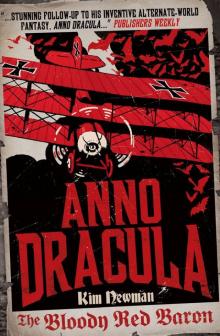 The Bloody Red Baron
The Bloody Red Baron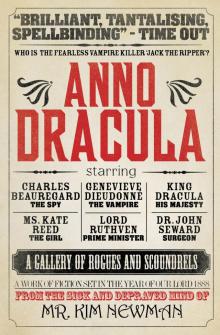 Anno Dracula
Anno Dracula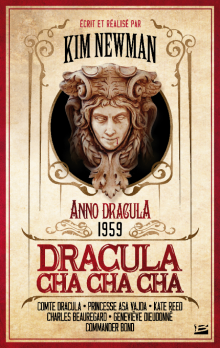 Dracula Cha Cha Cha
Dracula Cha Cha Cha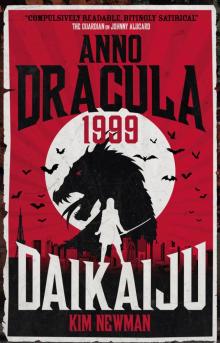 Anno Dracula 1999
Anno Dracula 1999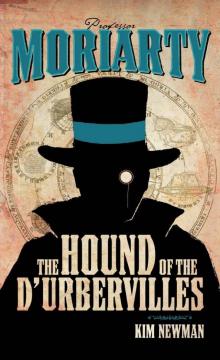 Moriarty: The Hound of the D'Urbervilles
Moriarty: The Hound of the D'Urbervilles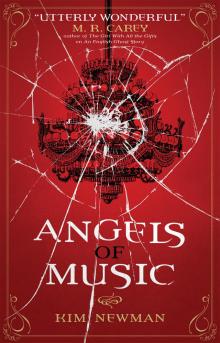 Angels of Music
Angels of Music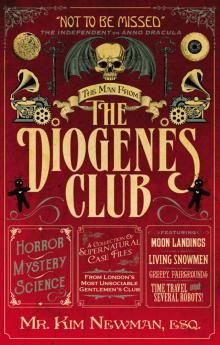 The Man From the Diogenes Club
The Man From the Diogenes Club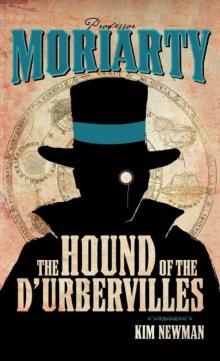 Professor Moriarty: The Hound Of The D’urbervilles
Professor Moriarty: The Hound Of The D’urbervilles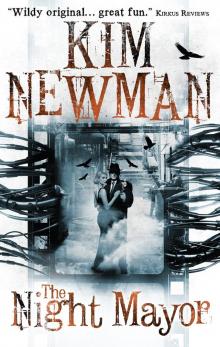 The Night Mayor
The Night Mayor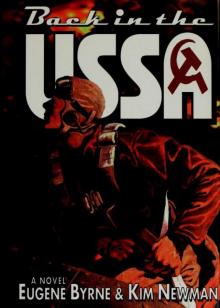 Back in the USSA
Back in the USSA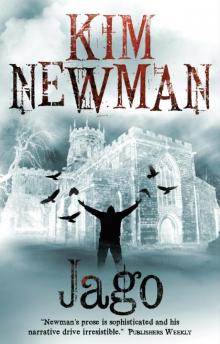 Jago
Jago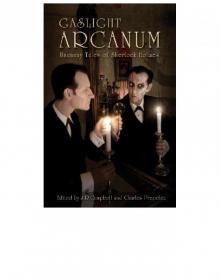 Gaslight Arcanum: Uncanny Tales of Sherlock Holmes
Gaslight Arcanum: Uncanny Tales of Sherlock Holmes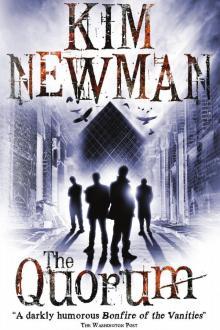 The Quorum
The Quorum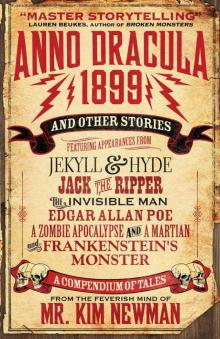 Anno Dracula 1899 and Other Stories
Anno Dracula 1899 and Other Stories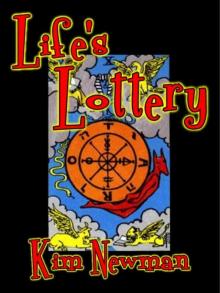 Life's Lottery
Life's Lottery The Secrets of Drearcliff Grange School
The Secrets of Drearcliff Grange School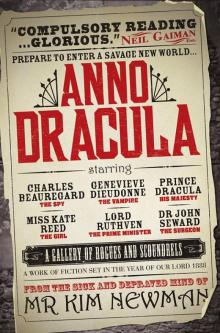 Anno Dracula ad-1
Anno Dracula ad-1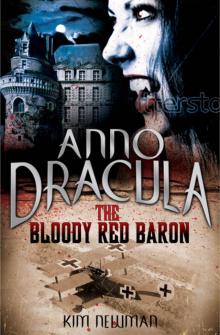 The Bloody Red Baron: 1918 ad-2
The Bloody Red Baron: 1918 ad-2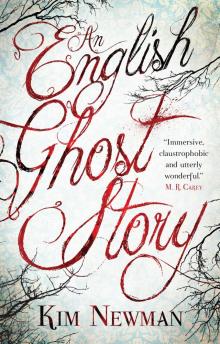 An English Ghost Story
An English Ghost Story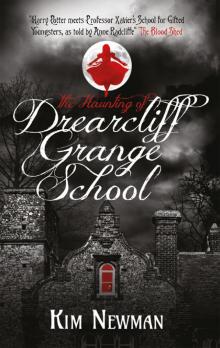 The Haunting of Drearcliff Grange School
The Haunting of Drearcliff Grange School The Other Side of Midnight
The Other Side of Midnight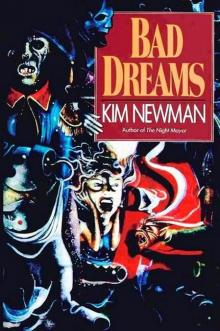 Bad Dreams
Bad Dreams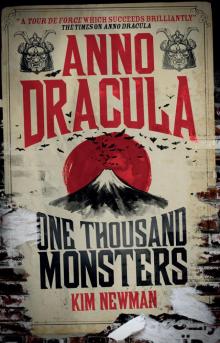 Anno Dracula--One Thousand Monsters
Anno Dracula--One Thousand Monsters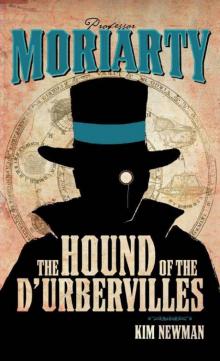 The Hound Of The D’urbervilles
The Hound Of The D’urbervilles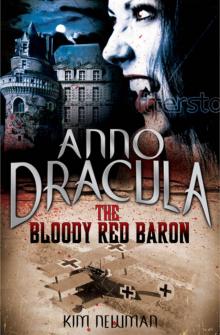 The Bloody Red Baron: Anno Dracula 1918
The Bloody Red Baron: Anno Dracula 1918